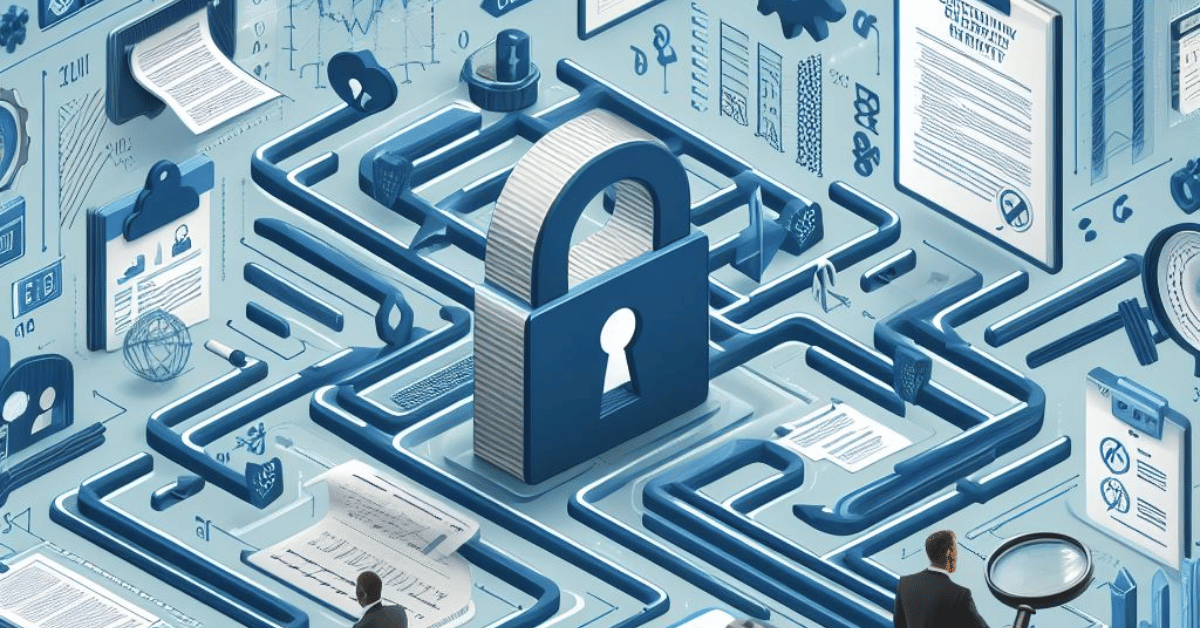Introduction
Data security certifications have become an essential aspect of IT infrastructure in recent years due to the increasing sophistication of cyber threats. These certifications provide organizations with a framework for implementing and maintaining secure information systems that protect sensitive data from unauthorized access and disclosure. However, many businesses are hesitant to pursue these certifications due to the perceived difficulty and expense involved in obtaining them.
Getting certified for data security is not as difficult or expensive as it may seem. There are several well-established frameworks available, such as ISO 27001 and NIST, that provide clear guidelines on what organizations need to do to meet certification requirements. Additionally, there are numerous tools and services available that can help automate the certification process and reduce both time and costs associated with achieving compliance.
By following established frameworks and utilizing available resources, businesses can achieve certification more easily than they might think.
Understanding Data Security Certifications

Definition Of Data Security Certifications
Data security certifications are credentials that professionals obtain to demonstrate their knowledge and expertise in securing sensitive information. These certifications can be obtained through accredited organizations, such as the International Association of Computer Science and Information Technology (IACSIT) or the International Information Systems Security Certification Consortium (ISC2).
Types of Certifications (e.g. ISO 27001, SOC 2, PCI DSS)
There are various types of data security certifications available today, each with its own unique set of requirements and standards.
One such certification is the ISO 27001 standard, which focuses on establishing, implementing, maintaining, and continually improving an information security management system within an organization. This certification is internationally recognized and has become a mandatory requirement for businesses that deal with sensitive or confidential information.
Another popular certification is SOC 2 (System and Organization Controls), which measures how well a company safeguards customer data. It is designed to help organizations that store sensitive information in the cloud to ensure they have implemented adequate controls to protect against unauthorized access or theft. The SOC 2 framework relies heavily on trust service principles – security, availability, processing integrity, confidentiality and privacy – that are used to evaluate the effectiveness of an organization’s internal controls.
There’s PCI DSS (Payment Card Industry Data Security Standard), which was created by major credit card companies to establish guidelines for handling credit card information securely. Compliance with this standard ensures that customer payment card data is protected from unauthorized access during all phases of payment processing – from transactions at point-of-sale terminals to online transactions through e-commerce sites.
Why Certifications Are Important For Businesses?
Having a certification will show that the business values its customers and their privacy. It also shows that the business has implemented strong security measures to protect sensitive information, such as personal and financial data.
Certifications also provide credibility and trustworthiness to the business. Customers are more likely to do business with a company that has been certified by a reputable organization because it assures them that their information is in safe hands.
Moreover, certifications can help businesses comply with legal regulations related to data protection. Businesses need to follow certain guidelines when it comes to handling customer data, and certifications ensure they are meeting those standards.
The Certification Process
Eligibility Criteria For Certification
To obtain a data security certification, candidates should meet certain eligibility criteria. Generally, these requirements vary depending on the type of certification. However, some of the common factors include a minimum level of education and experience in the relevant field. For instance, to become a Certified Information Systems Security Professional (CISSP), one must have at least five years of relevant work experience in two or more domains covered by CISSP’s Common Body of Knowledge.
Furthermore, some certifications demand specific technical skills that applicants should possess. For example, attaining a CompTIA Security+ certification requires proficiency in network protocols and topologies as well as an understanding of risk management and incident response measures.
Steps Involved In The Certification Process
The first step is to identify the type of certification required based on industry standards and regulations. This may include certifications like ISO 27001 or SOC 2.
Once the appropriate certification has been identified, the next step is to assess the organization’s current data security practices and identify any gaps that need to be addressed before certification can be obtained. This involves conducting a thorough risk assessment, implementing necessary controls, and documenting all processes.
After these steps have been completed, an external auditor will conduct an assessment to determine if the organization complies with the relevant standards and regulations. If successful, the organization will receive its certification and must maintain compliance through ongoing reviews and audits.
Common Challenges Faced During Certification

Understanding the complex requirements and standards involved in the certification process. For many, it can be difficult to navigate through the technical jargon and ensure that all necessary criteria have been met. Additionally, certain certifications may require a significant amount of documentation and evidence to support compliance with various regulations, which can also be time-consuming.
Identifying potential gaps in current data security measures or infrastructure that need to be addressed before certification can be achieved. This requires a thorough assessment of existing processes and systems to ensure they meet all necessary requirements for the specific certification being pursued. It may also involve making significant changes or investments in technology or personnel resources.
Maintaining compliance with certified status can prove challenging as regulations evolve over time. Companies must remain up-to-date on any changes or updates to their certification requirements and adjust their practices accordingly. Failure to do so risks loss of certified status and potential consequences such as fines or reputational damage.
The Benefits of Certification
Enhanced Security Measures
These certifications provide third-party validation that an organization has taken adequate measures to secure its systems and data.
Competitive Advantage In The Marketplace
Having a competitive advantage in the marketplace is key to success for many businesses. One way to establish this advantage is through obtaining data security certifications. These certifications provide customers with reassurance that their information is being protected and can set a business apart from its competitors.
Compliance With Legal Requirements
To be certified for data security, companies must demonstrate compliance with all applicable legal requirements. This means having appropriate policies and procedures in place to ensure that customer data is protected and secure.
The Challenges of Certification
Cost Of Certification
The cost of certification is a significant factor that organizations need to consider when pursuing data security certifications. While the expense may vary depending on the type of certification, it typically involves application fees, exam fees, and maintenance fees for maintaining the certification.
Gaining a Certified Information Systems Security Professional (CISSP) certification can cost around $699 for the exam fee alone, with additional costs for study materials and training courses factored in. Other certifications like Certified Information Systems Auditor (CISA) or Certified in Risk and Information Systems Control (CRISC) also come with significant expenses.
Time Required For Certification
Some certifications may take years before you can get certified. This is because they require more experience or knowledge in specific areas of data security that take time to acquire. The CISSP certification is one such example that requires at least five years of experience in two or more domains of their Common Body of Knowledge (CBK).
Maintaining Certification
Maintaining certification can be just as important as obtaining it in the first place. To maintain a data security certification, professionals must stay current on industry standards and best practices. This means keeping up with any changes or updates to regulations, technologies, and threats that could impact data security.
Factors to Consider When Choosing a Certification
Industry-Specific Requirements
The requirements for certification can vary greatly depending on the industry that your organization operates in. For example, if you are in the healthcare industry, you may need to comply with HIPAA regulations and obtain a HIPAA compliance certification. Similarly, if you deal with credit card information as part of your business operations, then you will need to become PCI-DSS compliant.
Geographic Location

One important consideration when seeking data security certifications is geographic location. Different countries and regions have their own laws and regulations regarding data privacy and security, which can impact the requirements and standards for obtaining certification. For example, the European Union’s General Data Protection Regulation (GDPR) has set strict guidelines for protecting the personal data of EU citizens, which may require additional measures to be taken by companies seeking certification.
In addition to legal considerations, geographic location can also affect access to training and resources necessary for certification. Some areas may have a shortage of qualified trainers or limited options for relevant courses or workshops. This can make it more challenging for individuals or organizations in those locations to obtain the necessary knowledge and skills.
FAQs
What Are The Most Popular Data Security Certifications?
The most popular data security certifications include Certified Information Systems Security Professional (CISSP), Certified Ethical Hacker (CEH), Certified Information Systems Auditor (CISA), and CompTIA Security+. CISSP is a globally recognized certification that demonstrates expertise in designing, implementing, and managing cybersecurity programs. CEH certifies an individual’s ability to identify weaknesses and vulnerabilities in target systems, enabling them to secure the system better.
CISA is another widely accepted certification that enables individuals to audit information systems, assess vulnerabilities, report findings, and recommend appropriate safeguards. CompTIA Security+ is an entry-level certification that validates proficiency in network security concepts, organization of information security policies, compliance regulations and procedures. Obtaining one or more of these certifications can help professionals advance their careers while also adding value to the companies for which they work.
How Long Does It Take To Get Certified?
The length of time it takes to get certified in data security depends on several factors, including the type of certification you are seeking and your prior knowledge and experience in the field. Some certifications, such as CompTIA Security+, can be obtained within a few months with self-study and preparation. Others, like Certified Information Systems Security Professionals (CISSP), may require years of experience and multiple exams to achieve.
Can Small Businesses Benefit From Certification?
Small businesses have a lot to gain from obtaining various certifications that can help them establish credibility and trust with their customers. One certification that many small businesses may find beneficial is the ISO 27001 certification, which focuses on information security management systems. Obtaining this certification can help smaller companies demonstrate their commitment to protecting sensitive data, which in turn can lead to increased customer confidence and higher revenues.
In addition to the ISO 27001 certification, there are other certifications that may be valuable for small businesses depending on their industry and target audience. For example, if a small business operates in the healthcare sector, obtaining HIPAA compliance certification can be crucial for winning contracts or attracting new clients who prioritize privacy and security when it comes to medical information.
Does Certification Guarantee 100% Data Security?
Certification doesn’t necessarily guarantee 100% data security. A certification merely provides evidence that a company has met certain criteria at a particular point in time. It doesn’t mean that the company is immune to future cyber threats or won’t have any security breaches in the future. Moreover, not all certifications are created equal. Some certifications may only cover basic security measures while others may require more stringent requirements.
Conclusion
Obtaining a data security certification may seem daunting, but it’s not impossible. It requires dedication and a thorough understanding of the standards set by the governing bodies. The process involves meticulous planning, documentation, implementation, and monitoring of security controls. However, it’s crucial to note that being certified is just one aspect of maintaining data security.
Organizations must continually review and enhance their security measures to ensure that they remain compliant with industry standards and regulations. This includes regularly conducting risk assessments and vulnerability scans while training employees on best practices for keeping sensitive information secure. Ultimately, achieving certification is just the beginning of a continuous commitment to safeguarding data against cyber threats.
